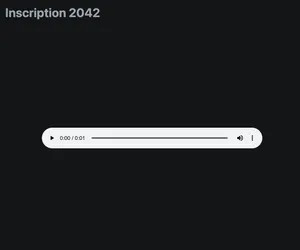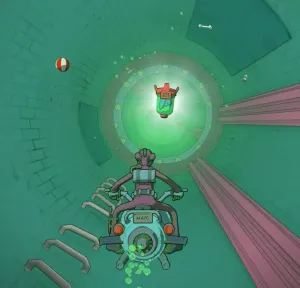Anyway, Bitcoin seems to be having its own little resurgence of NFT mania. On February 9, an "Ordinals Punk" — the Ordinals version of CryptoPunks — sold for 9.5 BTC (~$218,000). That record has now been broken by Inscription 2042, which is not an image but rather a 1-second-long audio recording of a fart sound. The NFT reportedly sold for 12.3 BTC (~$280,000), though it's tough to verify given the lack of any sort of Ordinals marketplace.
Fart noise reportedly sells for $280,000 in Bitcoin's own NFT mania
FDIC demands CEX.io stop claiming it's FDIC-insured
Many of these companies have taken the (true) statement that the company's insured depository accounts at various banking institutions are FDIC insured and presented it to customers in a misleading way, and the FDIC wants them to cut it out. The FDIC also demanded websites who published statements like "Is CEX.io Safe? Yes, Cex.io is a safe crypto exchange. Actually, one of the safest on the market since they are FDIC insured..." take them down.
CEX.io is a London-based cryptocurrency exchange with comparatively low trading volume compared to its larger competitors like Binance or Coinbase.
- "FDIC Demands Four Entities Cease Making False or Misleading Representations about Deposit Insurance", Federal Deposit Insurance Corporation
South Korean authorities issue arrest warrant to CEO of Tmon e-commerce platform for shilling Terra
Terra and Luna dramatically collapsed in May 2022, and South Korean authorities are still hunting for Terra leader Do Kwon, who is reportedly hiding in Serbia. Earlier this month, Korean authorities reportedly traveled to Serbia to try to locate him, but were unsuccessful.
dForce Network exploited for $3.65 million, funds returned
dForce contacted the hacker via blockchain transaction, offering to negotiate a bounty. Several days later, the project tweeted that the attacker had "c[o]me forward as a whitehat", and that the funds had been fully returned. "We have agreed to offer a bounty and will drop all on-going investigation and law enforcement actions," they announced.
Paxos ordered to stop minting Binance USD stablecoin, SEC sends Wells notice
Nearly simultaneously, the SEC sent a Wells notice to Paxos, informing them of imminent enforcement action. According to the Wall Street Journal, the SEC told Paxos they intended to sue the company for violating investor protection laws, and that the SEC believed Binance USD was an unregistered security.
Paxos agreed to stop minting new BUSD tokens (but will continue to honor redemptions), and said in a statement that they would be ending their stablecoin-minting relationship with Binance. As for the SEC, Paxos has promised to "vigorously litigate if necessary", arguing that BUSD is not a security.
- "Crypto firm Paxos to face SEC charges, ordered to stop minting Binance stablecoin", CNBC
- "Crypto Firm Paxos Faces SEC Lawsuit Over Binance USD Token", Wall Street Journal
- "Regulator Orders Crypto Firm Paxos to Stop Issuing Binance Stablecoin", Wall Street Journal
- Statement by the New York Department of Financial Services
- Statement by Paxos
Paxos faces investigation over stablecoin offerings
It's not quite clear the extent of the NYDFS investigation, though it joins rumors (denied by Paxos) that they were also being investigated by the US Office of the Comptroller of the Currency (OCC), which regulates banks. Paxos has a provisional banking charter, which it received from the OCC in 2021. It also has a virtual currency license, which is issued by the NYDFS.
Umami Finance halts yields, CEO dumps tokens amidst accusations of rugpull
Shortly after, the project CEO began dumping tokens on the market, cashing out 44,000 UMAMI tokens. These were ostensibly priced at $800,000, though the sell-off crashed the UMAMI price by more than 60% and ultimately netted the CEO around $380,000 of USDC.
Amidst the sell-off, a team member tried to reassure users that "the team resigned" but that also, confusingly, the "treasury assets are safe and in control of the team".
Kraken ends staking, pays $30 million fine in settlement with U.S. SEC
According to the SEC, Kraken had failed to register its staking-as-a-service program, which had generated $147 million in revenue.
This is not Kraken's first run-in with authorities, after paying a $360,000 fine to OFAC in November for sanctions violations.
Peer-to-peer Bitcoin exchange LocalBitcoins to shut down after ten years
LocalBitcoins cited "the ongoing very cold crypto-winter" as the rationale for the closure, and stated that new sign-ups would be suspended immediately. Trading will be suspended a week later, and users will have a year to withdraw Bitcoins they stored on LocalBitcoins' wallet product.
Yuga Labs' 3-week-long "Dookey Dash" game tournament ends amidst allegations of widespread cheating
Yuga Labs has said that, following the end of the three-week-long game tournament, the Sewer Passes with non-zero scores in the game will transform into something new, with the idea that higher scorers may receive more valuable NFTs.
This, of course, incentivized users to try to cheat in the game by creating bots, changing the browser-based game code to eliminate obstacles, or access game seeds that allowed them to predict the layout of a course run. Sewer Pass holders began paying others to play their game for them — either more skilled players, or players who were using these tools. Some were charging up to 2.5 ETH (~$4,200) to obtain scores of 700,000 or more for those who hired them.
Yuga Labs has promised to review gameplay to ensure that those who cheated are disqualified. They've also warned people buying Sewer Passes after gameplay ended that if they buy a pass that is determined to have cheated, it will be worthless. Some are skeptical of Yuga's ability to accurately detect cheaters, and others have expressed concern over false positives in the game's cheat detection that appeared to be caused by slower Internet connections.








